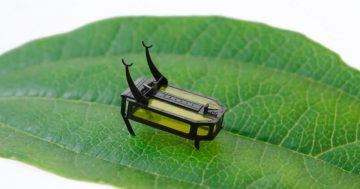Evan Ackerman in Spectrum ieee:

It’s no secret that one of the most significant constraints on robots is power. Most robots need lots of it, and it has to come from somewhere, with that somewhere usually being a battery because there simply aren’t many other good options. Batteries, however, are famous for having poor energy density, and the smaller your robot is, the more of a problem this becomes. And the issue with batteries goes beyond the battery itself, but also carries over into all the other components that it takes to turn the stored energy into useful work, which again is a particular problem for small-scale robots.
In a paper published this week in Science Robotics, researchers from the University of Southern California, in Los Angeles, demonstrate RoBeetle, an 88-milligram four legged robot that runs entirely on methanol, a power-dense liquid fuel. Without any electronics at all, it uses an exceptionally clever bit of mechanical autonomy to convert methanol vapor directly into forward motion, one millimeter-long step at a time.
The body of RoBeetle is a boxy fuel tank that you can fill with methanol by poking a syringe through a fuel inlet hole. It’s a quadruped, more or less, with fixed hind legs and two front legs attached to a single transmission that moves them both at once in a sort of rocking forward and up followed by backward and down motion. The transmission is hooked up to a leaf spring that’s tensioned to always pull the legs backward, such that when the robot isn’t being actuated, the spring and transmission keep its front legs more or less vertical and allow the robot to stand. Those horns are primarily there to hold the leaf spring in place, but they’ve got little hooks that can carry stuff, too.
More here.
